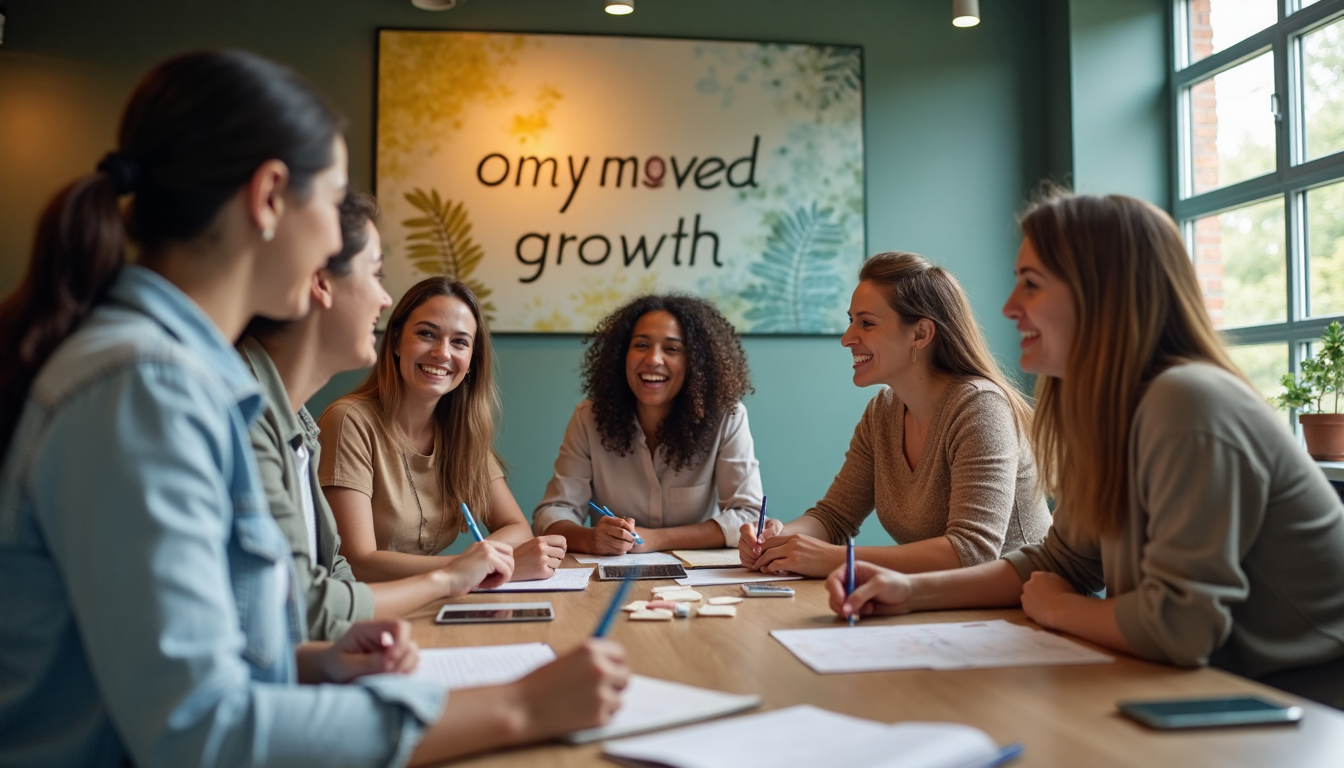Unlocking Your Potential in 2025: Practical Steps for Lasting Growth
Unlocking your potential is about more than sheer willpower. Even high achievers often overlook that daily self-reflection practices can lead to a dramatic boost in personal growth and adaptability. Most surprising of all, setbacks early in your journey may actually set you up for greater long-term success than a perfect track record ever could.
Table of Contents
- Understanding The Barriers To Unlocking Your Potential
- Proven Habits For Personal And Professional Growth
- Mindfulness And Spiritual Practices For Self-Discovery
- Building A Lasting Foundation For Continued Success
Quick Summary
| Takeaway | Explanation |
|---|---|
| Understand and Address Barriers | Recognize internal psychological barriers like self-doubt and fear of failure, and external constraints such as societal expectations, to break through personal limitations. |
| Implement Proven Growth Habits | Engage in daily self-reflection and continuous learning, set SMART goals, and manage time effectively to support sustained personal and professional growth. |
| Cultivate Mindfulness and Spiritual Awareness | Explore mindfulness and spiritual practices for deeper self-discovery, creating intentional spaces for introspection and genuine personal transformation. |
| Build Resilience Through Strategic Learning | View challenges as learning opportunities to develop resilience, emotional intelligence, and adaptive thinking as key strategies for long-term success. |
| Integrate Holistic Success Practices | Focus on balancing career growth with personal well-being, maintaining clear boundaries, and creating fulfilling, purpose-driven life systems for sustainable success. |
Understanding the Barriers to Unlocking Your Potential
Unlocking your potential requires more than just good intentions. Hidden psychological and environmental barriers can prevent even the most motivated individuals from achieving their true capabilities. Understanding these obstacles is the first critical step in breaking through personal limitations and creating meaningful growth.

Internal Psychological Barriers
Mental blocks represent some of the most challenging obstacles to personal development. Research involving Portuguese university students revealed significant differences in how individuals perceive and experience barriers to their potential. Female students frequently identified inhibition and shyness as primary constraints, while male students predominantly cited lack of motivation as their central challenge.
Self doubt emerges as a powerful internal barrier. People often wrestle with imposter syndrome, questioning their abilities and worthiness. This internal dialogue creates invisible walls that prevent individuals from taking risks, exploring new opportunities, and pushing beyond their comfort zones. The persistent narrative of “I’m not good enough” can paralyze potential and suppress personal growth.
Another critical psychological barrier is fear of failure. This deep seated emotional response triggers avoidance behaviors, causing individuals to retreat from challenging situations rather than confronting them. The psychological safety of remaining static becomes more appealing than the potential discomfort of growth and transformation.
External Environmental Constraints
External factors can significantly impede personal development. Academic research demonstrates that professional environments with excessive administrative duties, limited resources, and restrictive structures can dramatically reduce an individual’s capacity for growth and innovation.
Social and cultural expectations also play a substantial role in limiting potential. Familial pressures, societal norms, and systemic barriers can create invisible boundaries that discourage individuals from pursuing unconventional paths or challenging established paradigms. These external constraints often operate subtly, making them difficult to recognize and overcome.
Mental Health and Self Perception
A comprehensive study of Greek university students uncovered a profound connection between mental health literacy and personal development. The research indicated that individuals with higher mental health awareness demonstrate more positive attitudes toward personal growth and reduced self stigma when seeking psychological support.
Mental health barriers can manifest as chronic stress, unresolved trauma, or persistent negative thought patterns. These psychological states create internal resistance to change, making it challenging to implement new strategies or embrace personal transformation. Recognizing and addressing these underlying mental health considerations becomes crucial in unlocking one’s true potential.
Breaking through these barriers requires a multifaceted approach. Self awareness, consistent personal development practices, and a willingness to challenge existing mental frameworks are essential. By understanding and systematically addressing these obstacles, individuals can create pathways for genuine growth and remarkable personal transformation.
Below is a table summarizing key internal and external barriers to unlocking your potential, as discussed above:
| Barrier Type | Common Examples | Impact on Potential |
|---|---|---|
| Internal (Psychological) | Self-doubt, fear of failure, imposter syndrome, lack of motivation, inhibition, shyness | Hinders risk-taking, limits growth, prevents action |
| External (Environmental) | Administrative overload, limited resources, restrictive structures, societal norms, family pressure | Blocks opportunities, discourages innovation, enforces conformity |
| Mental Health & Self-Perception | Chronic stress, trauma, negative thoughts, low mental health literacy | Increases resistance to change, affects confidence |
Proven Habits for Personal and Professional Growth
Sustained personal and professional growth demands intentional practices that transform potential into tangible progress. Developing strategic habits provides the foundation for continuous improvement and meaningful achievement across all life domains.
Daily Self Reflection and Learning
Research demonstrates that consistent self reflection practices dramatically enhance personal development. Engaging in daily journaling, meditation, or structured self assessment creates powerful opportunities for introspection and growth. These practices allow individuals to analyze their experiences, identify patterns, and make conscious adjustments to their behaviors and thought processes.
Continuous learning emerges as another critical habit for personal advancement. Professional development research indicates that individuals committed to acquiring new skills maintain greater adaptability and resilience. This might involve reading professional literature, attending workshops, taking online courses, or engaging with mentors who can provide strategic insights into professional growth.
For those seeking deeper strategies, explore our comprehensive guide on transformative personal development techniques.
Strategic Time Management and Goal Setting
Time management studies reveal that structured routines significantly boost productivity and reduce stress. Effective goal setting requires more than simple wishful thinking. Successful individuals implement SMART goal frameworks: Specific, Measurable, Achievable, Relevant, and Time bound objectives that provide clear direction and measurable progress.
Implementing a consistent planning system helps transform abstract aspirations into concrete actions. This might involve weekly review sessions, maintaining a detailed planner, or using digital tools that track progress and send accountability reminders. Breaking larger goals into smaller, manageable tasks prevents overwhelm and maintains motivation through incremental achievements.
Holistic Well Being and Resilience
 Personal growth extends beyond professional achievements. Developing habits that support physical and mental well being creates a robust foundation for sustained success. Regular exercise, balanced nutrition, quality sleep, and stress management techniques contribute to enhanced cognitive performance and emotional stability.
Personal growth extends beyond professional achievements. Developing habits that support physical and mental well being creates a robust foundation for sustained success. Regular exercise, balanced nutrition, quality sleep, and stress management techniques contribute to enhanced cognitive performance and emotional stability.
Building emotional resilience involves cultivating practices that help navigate challenges constructively. This includes developing healthy coping mechanisms, maintaining a growth mindset, practicing mindfulness, and creating supportive social networks. Resilient individuals view obstacles as opportunities for learning and personal transformation rather than insurmountable barriers.
Ultimately, proven growth habits require consistent commitment and self compassion. Progress is not linear, and embracing the journey with patience and persistence becomes as important as the specific techniques employed. By integrating these strategic practices into daily life, individuals can systematically unlock their potential and create meaningful, sustainable personal and professional development.
The following table summarizes proven personal growth habits and their associated benefits:
| Habit/Practice | How to Practice | Key Benefit |
|---|---|---|
| Daily Self-Reflection | Journaling, meditation, structured self-assessment | Increases insight & adaptability |
| Continuous Learning | Reading, workshops, online courses, mentorship | Boosts resilience & professional adaptability |
| Effective Time Management & Goal Setting | SMART goals, planning systems, weekly reviews | Achieves focus, productivity, and motivation |
| Physical & Mental Well-Being | Exercise, nutrition, sleep, stress management | Supports cognition & emotional stability |
| Emotional Resilience | Coping skills, growth mindset, mindfulness | Turns setbacks into growth, enhances optimism |
Mindfulness and Spiritual Practices for Self-Discovery
Self discovery represents a profound journey of internal exploration that transcends conventional personal development approaches. Mindfulness and spiritual practices offer transformative pathways to understanding oneself more deeply, connecting with inner wisdom, and cultivating genuine personal growth.
Neurological Foundations of Mindfulness
Functional neuroimaging research reveals fascinating insights into meditation’s impact on brain functioning. Different meditation techniques activate distinct neural networks, demonstrating that spiritual practices are not merely subjective experiences but have measurable neurological foundations. Focused attention, mantra recitation, open monitoring, and compassion meditation each produce unique patterns of brain activation and deactivation.
Mindfulness Based Stress Reduction (MBSR) programs have demonstrated remarkable psychological benefits. Scientific studies indicate significant improvements in spirituality, psychological well being, and medical symptom management. Practitioners experience increased self awareness, reduced psychological distress, and enhanced emotional regulation through consistent mindfulness practice.
For those interested in exploring deeper spiritual insights, learn more about authentic spiritual practices.
Holistic Wellness Through Spiritual Practices
Traditional spiritual practices offer more than psychological benefits. Groundbreaking research demonstrates that meditative techniques can positively influence biological processes. These practices can downregulate stress response pathways associated with chronic conditions like anxiety, obesity, type 2 diabetes, and depression.
Spiritual practices create a comprehensive approach to wellness by integrating mental, emotional, and physiological dimensions. Techniques such as meditation, breathwork, and contemplative prayer activate the body’s natural healing mechanisms, promoting resilience and internal balance. Regular practice helps individuals develop a more nuanced understanding of their internal landscape, facilitating profound personal transformation.
Cultivating Authentic Spiritual Awareness
Authentic spiritual growth requires more than passive participation. It demands active engagement, self reflection, and a willingness to challenge existing belief systems. Developing a consistent practice involves creating intentional spaces for silence, introspection, and conscious observation of internal experiences.
Journaling, meditation, silent retreats, and guided contemplative practices serve as powerful tools for deepening spiritual awareness. These methods help individuals distinguish between superficial thought patterns and deeper intuitive wisdom. By creating regular opportunities for internal dialogue, practitioners can uncover hidden aspects of themselves and develop a more compassionate, integrated sense of identity.
The journey of self discovery through mindfulness and spiritual practices is ultimately a deeply personal experience. While scientific research provides valuable insights, individual exploration remains the most profound teacher. Embracing curiosity, maintaining an open mind, and approaching spiritual practices with genuine humility creates the most fertile ground for transformative growth and self understanding.
Building a Lasting Foundation for Continued Success
Creating a sustainable path to success requires more than momentary achievements. It demands a strategic approach that integrates personal growth, resilience, and continuous learning into a comprehensive life framework.
Strategic Leadership and Personal Development
Research on leadership development highlights the importance of structured competency building. Successful individuals understand that growth is not accidental but a deliberate process of skill acquisition, self reflection, and strategic planning. This involves creating clear personal development goals, identifying skill gaps, and systematically working to bridge those opportunities.
Mentorship emerges as a critical component of sustained success. Comprehensive studies reveal that quality mentorship significantly impacts long term professional trajectory. Mentors who invest deeply in their proteges create exponential growth opportunities, with mentees often achieving 37% larger professional networks and more robust career development compared to those without dedicated guidance.
Discover strategies for building a robust personal development roadmap.
Resilience Through Strategic Learning
Groundbreaking research demonstrates that early career setbacks can paradoxically lead to greater long term success. Individuals who experience challenges and near misses often develop deeper resilience and more sophisticated problem solving skills. These experiences create a more nuanced understanding of professional landscapes, enabling more strategic decision making.
Building resilience requires cultivating a growth mindset that views challenges as opportunities for learning rather than insurmountable obstacles. This involves developing emotional intelligence, practicing adaptive thinking, and maintaining a consistent commitment to personal and professional development. Successful individuals transform potential setbacks into powerful moments of insight and transformation.
Holistic Success Integration
True lasting success transcends professional achievements. It requires a holistic approach that balances career growth with personal well being, relationships, and intrinsic satisfaction. This means creating integrated life systems that support continuous learning, maintain physical and mental health, and align professional pursuits with personal values.
Key strategies include developing robust support networks, maintaining clear boundaries between work and personal life, practicing consistent self care, and regularly reassessing personal goals. Success becomes not just about external achievements but about creating a fulfilling, purpose driven existence that feels authentic and meaningful.
Building a lasting foundation for continued success is an ongoing journey of self discovery, strategic planning, and intentional growth. It requires patience, commitment, and a willingness to embrace both challenges and opportunities with equal enthusiasm. By approaching personal development as a comprehensive, lifelong process, individuals can create sustainable pathways to remarkable achievement and genuine fulfillment.
Frequently Asked Questions
What are the main barriers to unlocking my potential?
Understanding both internal psychological barriers, like self-doubt and fear of failure, and external environmental constraints, such as societal expectations, is crucial to overcoming limitations and achieving personal growth.
How can daily self-reflection contribute to personal growth?
Engaging in daily self-reflection practices, such as journaling or meditation, enhances awareness and adaptability, helping you identify patterns in your behavior and make informed adjustments towards your goals.
What role does mindfulness play in personal development?
Mindfulness practices cultivate self-awareness and emotional regulation, leading to deeper self-discovery and a greater capacity for personal transformation by promoting a balanced mental state.
How can I build resilience in the face of setbacks?
Building resilience involves adopting a growth mindset, viewing challenges as learning opportunities, and developing emotional intelligence to navigate obstacles effectively and come back stronger.
Turn Knowledge into Lasting Growth with Luminary Voice
Have you ever felt your progress is held back by self-doubt, overwhelm, or uncertainty about your next step? This article highlights how internal barriers like fear of failure and external pressures can stop you from reaching your true potential. You are not alone if persistent negative thoughts or lack of clear strategies make personal transformation feel beyond reach. At Luminary Voice, we understand these challenges. We offer structured resources for self-reflection, habit-building tools, and guided spiritual practices designed to help you actively break through these exact obstacles.

Imagine turning every insight from your daily routine into real personal and professional growth. Join a supportive community and access exclusive content, proven growth activities, and success strategies. Explore Luminary Voice today and take the first step with our transformative personal development techniques and deep-dive spiritual retreats guide. Start acting on your goals now and discover how daily practices supported by our expert guidance can help you unlock your potential in 2025.
Recommended
- The 15 Invaluable Laws of Growth
- 10 Growth Mindset Books That Will Radically Transform Your Approach to Success
- Best Personal Development Tips You Haven’t Heard Before
- Where Your Magical Abilities Really Bloom
- Empower Your Learning Journey to the World of Online Education for Personal and Professional Growth
- Building Social and Professional Capital to Achieve Growth







